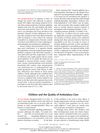 April 2014 in “Journal of evolution of medical and dental sciences”
April 2014 in “Journal of evolution of medical and dental sciences” Women over forty can maintain skin and hair health with lifestyle and dietary changes.
 January 2014 in “Journal of the Egyptian Women's Dermatologic Society (Print)”
January 2014 in “Journal of the Egyptian Women's Dermatologic Society (Print)” Women with acne after adolescence are more likely to have PCOS and should be checked for it.
 December 2013 in “Macedonian Journal of Medical Sciences”
December 2013 in “Macedonian Journal of Medical Sciences” Ovarian steroid cell tumors should be considered in adults with hirsutism and high testosterone, with surgery as the main treatment.
 November 2013 in “John Wiley & Sons, Ltd eBooks”
November 2013 in “John Wiley & Sons, Ltd eBooks” The document concludes that accurate diagnosis of male and female gonadal disorders is crucial for effective treatment and better patient outcomes.
 October 2013 in “Springer eBooks”
October 2013 in “Springer eBooks” PCOS is a hormonal disorder causing infertility and menstrual problems, often linked to obesity and can lead to acne, treated with hormonal and insulin-sensitizing medications.

Different hair and nail conditions can indicate health issues and have specific treatments; accurate diagnosis is crucial before treatment.
 October 2012 in “Journal der Deutschen Dermatologischen Gesellschaft”
October 2012 in “Journal der Deutschen Dermatologischen Gesellschaft” Post-implantation erythema is a red skin condition after medical device implantation that sometimes goes away on its own.
 June 2012 in “Springer eBooks”
June 2012 in “Springer eBooks” Eating disorders can cause various hair problems, and while hair loss in these disorders is linked to metabolic syndrome, treatment focuses on specific medications and lifestyle changes for the syndrome.
 May 2010 in “Current Women's Health Reviews”
May 2010 in “Current Women's Health Reviews” The document concludes that early diagnosis and treatment of PCOS in teenagers is important for managing symptoms and preventing long-term health problems.
 January 2008 in “The New England Journal of Medicine”
January 2008 in “The New England Journal of Medicine” Children receive less than half of recommended health care, and routine hormonal testing for female-pattern hair loss is unnecessary without other androgen excess symptoms.
 January 2008 in “Pratique médicale & chirurgicale de l'animal de compagnie”
January 2008 in “Pratique médicale & chirurgicale de l'animal de compagnie” Alopecia X in dogs is a cosmetic issue, not a hormonal disorder, and harmful treatments should be avoided.
 March 2022 in “International journal of pharmaceutical sciences review and research”
March 2022 in “International journal of pharmaceutical sciences review and research” PCOS is a hormonal issue in women that is usually treated with birth control pills, metformin, and lifestyle changes, with early treatment helping to reduce complications and improve life quality.
 June 2016 in “International journal of recent surgical and medical science”
June 2016 in “International journal of recent surgical and medical science” Early balding in men is linked to metabolic syndrome, so screening is important for prevention.
 September 2022 in “Annals of medicine and surgery”
September 2022 in “Annals of medicine and surgery” Three siblings with a rare genetic condition had abnormal sexual development and chose different gender identities, needing surgery and therapy.

The document cannot be understood or processed.
 6 citations,
October 2020 in “medRxiv (Cold Spring Harbor Laboratory)”
6 citations,
October 2020 in “medRxiv (Cold Spring Harbor Laboratory)” Early treatment improved COVID-19 outcomes, and spironolactone helped reduce risks in females with high androgen levels.
5 citations,
October 2017 in “JOGC/Journal of obstetrics and gynaecology Canada” The conclusion is that proper diagnosis and long-term treatment, including medication, hair removal, and lifestyle changes, are important for improving hirsutism, especially in PCOS patients.
3 citations,
December 1982 in “Australasian journal of dermatology” Tailored treatments combining medication and hair removal methods are effective for managing excessive hair growth in women.

Polycystic ovary syndrome (PCOS) affects about 10% of women, is often linked to obesity and family history, and can cause irregular periods, fertility issues, and other symptoms. It's usually managed with lifestyle changes, weight loss, and medication.
January 2021 in “Voprosy ginekologii akušerstva i perinatologii” Effective management of hyperandrogenism in young women requires accurate diagnosis and tailored treatment.
3 citations,
April 2009 in “Pediatrics in review” Doctors need to recognize and treat metabolic disorders in children early to prevent serious health issues.
November 2020 in “AACE clinical case reports” A woman's severe male hormone excess was caused by a small, hard-to-find ovarian tumor.
1947 citations,
September 1995 in “New England journal of medicine/The New England journal of medicine” PCOS is a common hormonal disorder causing irregular periods and increased hair growth, linked to insulin resistance and long-term health issues.
89 citations,
March 2001 in “Endocrine practice” The guidelines help doctors diagnose and treat hormone-related disorders in women.
67 citations,
January 1997 in “Lancet” Hirsutism is when women have too much hair growth, often due to a bit more androgen hormones and sensitive skin.
 20 citations,
January 2016 in “Open Journal of Endocrine and Metabolic Diseases”
20 citations,
January 2016 in “Open Journal of Endocrine and Metabolic Diseases” PCOS affects fertility and is linked to obesity and menstrual irregularities; lifestyle changes are recommended for treatment.
12 citations,
May 2005 in “Fertility and Sterility” Higher insulin levels are linked to larger ovaries in women with idiopathic hirsutism.
 11 citations,
November 2017 in “Hong Kong Medical Journal”
11 citations,
November 2017 in “Hong Kong Medical Journal” Polycystic ovary syndrome increases the risk of diabetes, heart disease, and endometrial cancer, and requires early treatment to manage these risks.
 5 citations,
March 2022 in “Frontiers in Endocrinology”
5 citations,
March 2022 in “Frontiers in Endocrinology” A model using hormone levels, cycle length, and BMI can help identify PCOS in Chinese women but isn't for screening teens.
 4 citations,
May 2022 in “BMC Women's Health”
4 citations,
May 2022 in “BMC Women's Health” High levels of anti-Müllerian hormone can indicate polycystic ovarian syndrome in women who can have babies.





















